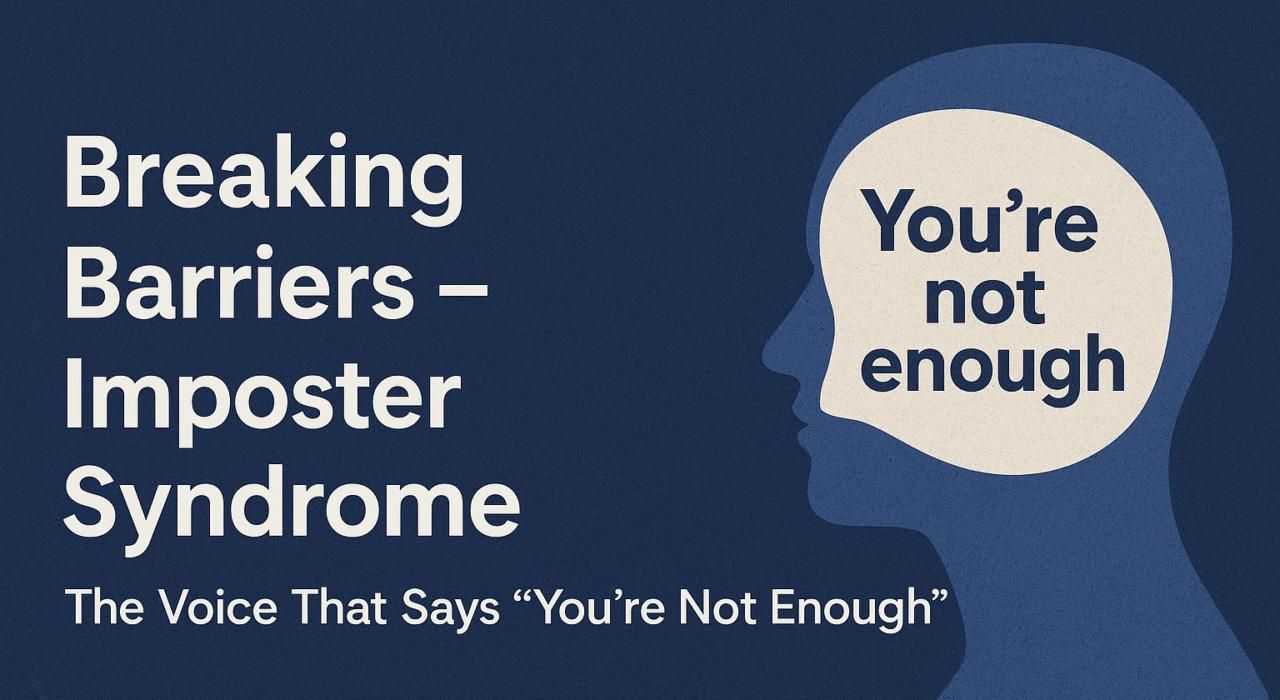Breaking Barriers: Imposter Syndrome
The Voice That Says “You’re Not Enough”
You’ve just finished a show, a studio session, or maybe released something you’ve poured your soul into. Compliments are coming in, people are moved, and still — that small, relentless voice whispers:
“Did I really deserve that?”
“Maybe they’re overestimating me.”
“What if they find out I’m not as good as they think?”
That’s Imposter Syndrome — the invisible barrier that tells artists, “You’re faking it,” even when the evidence says you’re thriving. Studies suggest that nearly 70% of high achievers experience it at some point — and in the music world, where identity and art are so deeply intertwined, it can feel like a shadow following your every success.
Why Imposter Syndrome Hits Creatives So Hard
Music is personal. You don’t just create songs — you create pieces of yourself. And when your art becomes public, every bit of praise can feel like pressure. Every opportunity can stir the fear that you somehow “tricked” your way there.
Here’s what usually fuels it:
1. Comparison Culture:
Scrolling through social media, seeing others win awards, land gigs, or go viral — it can make your own progress feel invisible. You forget that every artist’s journey unfolds at its own rhythm.
2. High Standards, Low Self-Compassion:
Perfectionism and passion often walk hand in hand. But when “doing your best” becomes “never good enough,” success starts feeling like survival.
3. Early Conditioning:
If you grew up needing to prove your worth or downplay achievements to avoid attention, recognition can feel uncomfortable — even undeserved.
4. The Artist’s Paradox:
Artists constantly stretch beyond comfort zones. The more you evolve, the more you question your belonging. Growth can trigger doubt, not because you’re failing — but because you’re expanding.
The Cycle of Self-Doubt
Imposter thoughts often follow a predictable pattern:
-
You achieve something meaningful.
-
You discount it — attributing it to luck, timing, or help from others.
-
You fear exposure — believing someone will “find out” you’re not as capable.
-
You overwork or self-sabotage — either trying to prove yourself or withdrawing to avoid being “exposed.”
And yet, here’s the truth that Imposter Syndrome hides:
You can’t fake consistency.
You can’t pretend to show up again and again for your art.
You can’t accidentally inspire others.
Every song written, every performance delivered, every risk taken — it all builds a record of authenticity that no inner critic can erase.
Reframing the Inner Voice
When that voice says, “You’re not enough,” it’s not always trying to bring you down. Often, it’s a younger, protective part of you afraid of being seen or failing. Instead of silencing it, try listening with compassion.
Ask yourself:
- What is this voice trying to protect me from?
- What evidence do I have that contradicts what it’s saying?
- When have I proven my capability before?
Confidence doesn’t come from never doubting yourself — it comes from acting despite the doubt, again and again.
The Practical Shift
You can’t eliminate imposter thoughts entirely — but you can change your relationship with them.
1. Name it.
When doubt creeps in, don’t merge with it. Label it: “That’s my imposter voice talking.” Naming it separates you from it.
2. Ground in facts, not feelings.
Keep a “proof folder” — messages, photos, reviews, milestones. When your mind forgets, your evidence reminds you.
3. Speak your truth.
Talk about it with mentors, peers, or coaches. Imposter Syndrome thrives in silence; it loses power when spoken aloud.
4. Redefine success.
Shift from proving yourself to expressing yourself. When the goal becomes authentic creation instead of validation, fear loses its grip.
Closing Reflection – The Mirror Test
Imagine standing before a mirror right before your next big moment — studio, stage, or release. Behind your reflection are all the versions of you who worked, failed, learned, and grew to get here.
They’re not imposters. They’re evidence.
Evidence that you’ve earned every step — through persistence, vulnerability, and courage.
When you stand there, breathe, and look past the surface, you’ll see it clearly:
You didn’t stumble into this moment. You built it.
“The biggest illusion of Imposter Syndrome is that you’re alone in it. You’re not. Even the artists you admire most have felt it — they just kept creating anyway.”

